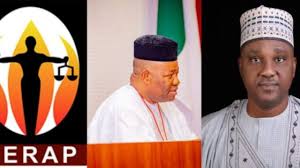
Daniel Otera
Socio-Economic Rights and Accountability Project has instituted legal proceedings against Senate President Godswill Akpabio and Speaker of the House of Representatives Tajudeen Abbas over their alleged failure to investigate claims that lawmakers pay up to ₦3 million to sponsor bills and motions at the National Assembly.
The civil society organisation filed the suit at the Federal High Court, Abuja, naming Mr Akpabio and Mr Abbas as defendants representing themselves and all members of the National Assembly.
The legal action follows recent allegations by Ibrahim Auyo, a member representing Jigawa State on the platform of the All Progressives Congress, who claimed in a viral video recorded in Hausa that legislators pay between ₦1 million and ₦3 million to present bills, motions and petitions at the National Assembly.
In suit number FHC/L/CS/2214/2025 filed last week, SERAP is seeking an order of mandamus compelling the two presiding officers to refer the bribery allegations to appropriate anti-corruption agencies for investigation and prosecution.
The organisation is also demanding protection for Mr Auyo, whom it describes as a whistleblower acting in public interest.
According to court documents, SERAP argues that the alleged practice constitutes “a grave violation of the public trust and constitutional oath of office by lawmakers.”
The suit, filed by SERAP’s legal team comprising Kolawole Oluwadare, Kehinde Oyewumi and Andrew Nwankwo, states: “These allegations have exposed how lawmakers are abusing their entrusted positions to deny Nigerians of their constitutional and democratic rights.”
SERAP contends that lawmakers should not be required to pay bribes to present motions and bills, adding that such practices undermine democratic rights and make “a mockery of lawmaking and legislative powers under Section 4 of the Nigerian Constitution 1999 (as amended).”
The organisation further argues that the allegations represent fundamental breaches of the Constitution and Nigeria’s anti-corruption legislation, as well as the country’s obligations under the United Nations Convention Against Corruption, to which Nigeria is a signatory.
In the viral video, Mr Auyo had stated: “Since I was elected as a member in 2015, no individual has given me a bill to pass. And also, even the bills and petitions are paid for.”
He added: “You have to pay from ₦3 million, ₦2 million, or ₦1 million to present it (a bill). And after you present the bill, you must follow up by lobbying the whole 360 members of the House to accept the bill.”
SERAP notes in its suit that similar unreported allegations may exist in the Senate.
The organisation argues that investigating the allegations would build trust in democratic institutions and strengthen the rule of law, whilst emphasising that the National Assembly should function as a proper and accountable legislative body representing and protecting public interest.
Citing Article 33 of the UN Convention Against Corruption, SERAP describes Mr Auyo as a protected whistleblower due to his public interest disclosures.
“Ending the persistent allegations of corruption in the National Assembly and the prevailing culture of impunity of perpetrators is a matter of the rule of law and public interest,” the suit reads.
SERAP further invokes Section 15(5) of the Nigerian Constitution, which requires public institutions, including the National Assembly, to abolish all corrupt practices and abuse of power.
The organisation maintains that ensuring investigation and prosecution of suspected perpetrators would improve transparency and accountability in the National Assembly whilst building trust in democratic institutions.
No date has been fixed for the hearing of the suit.
